

Guide to Careers 2025–26
Solving the Puzzle of Global Markets
Jane Street is a global trading rm with o ces in New York, London, Hong Kong, Singapore, and Amsterdam. Our approach is rooted in technology and rigorous quantitative analysis, but our success is driven by our people.
We are always recruiting top candidates and we invest heavily in teaching and training. Our summer internships give you a real sense of working at Jane Street full-time.
Learn more about us and our roles at our programs and events. No nance experience needed. We look for a passion for critical thinking and creative problem-solving – people like you!
Learn more about Jane Street:

MANAGING
MARK CURTIS
DESIGN & ART DIRECTION ANDREW BROWN
COVER ILLUSTRATION
DAISY COOPER
VARSITY MICHAELMAS EDITORS 2025
BEN CURTIS
CHARLIE ROWAN
FEATURING
AMY BATLEY
FAMKE VEENSTRA-ASHMORE
SARAH ABBAS
LOTTE BRUNDLE
REBECCA THOMAS
PRINTED BY SHORT RUN PRESS LIMITED
Welcome to the latest edition of the Varsity Guide to Careers!
We’re often told that the graduate job market is a minefield. While it is not without its challenges, we can often forget how many opportunities are open to us. Applying for jobs may be a daunting prospect, but there’s a path for everyone.
Both of us are fortunate to know friends who have graduated into exciting careers in journalism, creative industries, consultancy, and many more fields. Yet, as students, it often feels impossible to narrow our options down and escape uncertainty over our future. We hope that this guide provides insight into what postCambridge life can hold.
out. Whether it's a reassuring story from an alumnus, or a company giving you a spark of inspiration, throughout these pages you will find proof that opportunities remain as vibrant as ever.
So enjoy, and we wish you every success with your future endeavours, wherever they lead you.
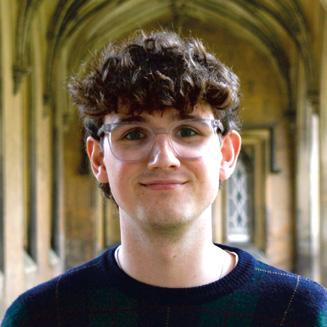

VARSITY PUBLICATIONS
16
WWW.VARSITY.CO.UK
BUSINESS@VARSITY.CO.UK
VARSITY GUIDE
The truth is that there’s no right or wrong way to do postgraduate life. Some students know exactly what they want to do from the day they arrive in Cambridge. Most of us, however, find out along the way. So, as you comb through this guide, remember that you don’t need to have it all figured
Ben Curtis and Charlie Rowan









Your career at d-fine




We are a European consultancy firm focussed on analytical and quantitative topics and the development of sustainable solutions to bring about positive change for our clients.
What does d-fine offer you?
- Diversity: Work with clients on topics ranging from financial engineering and machine learning through to climate risk and healthcare
- International: Collaborate in project teams staffed across Europe
- Education: Acquire new skillsets to broaden your technical and professional repertoire
Who do we look for?
Master’s or PhD-level graduates in STEM fields
How can I apply?
Please go to our Job Portal

d-fine
d-fine is a European consultancy firm with over 1,800 employees, distributed across eleven offices in seven countries. Our focus is on quantitative issues and the development of sustainable technological solutions. d-fine's consulting approach is based on years of practical experience driven by employees with analytical and technological skills. This combination has proven itself with more than two hundred clients across all sectors of the economy, owing to its bespoke fit, efficiency and sustainable implementation.
To expand our consulting team, we are looking for students or graduates of physics, mathematics, computer science, engineering, economics or other natural sciences with quantitative or technological specialisations. You must have an excellent academic record, be fluent in English
and have a high mathematical and/or technological affinity. In addition to strong analytical skills and a resultoriented approach, we attach great importance to social competence. A “team-first” approach is at the core of our company philosophy and is reflected in project structures, employee development and incentive systems.
Our aim is that you feel at home with us and remain motivated for the long term. That is why we offer you, in addition to exciting projects, a collegial team, attractive career and salary model, and a wide range of additional benefits, such as our extensive training program as part of the d-fine Academy.
We are continually looking for new talent and would welcome your application to join d-fine.
SEO London: 25 years of opening doors to competitive industries
Sponsors for Educational Opportunity Ltd. (SEO London) is a UK registered charity and for 25 years has been a driving force in levelling the playing field for students and young professionals from underrepresented backgrounds. As leaders in breaking down economic and cultural barriers for young people seeking employment, SEO London transforms career opportunities for the next generation.
Since its founding in 2000, SEO London has supported over 9,000 participants into placements across the most competitive industries, with many progressing to senior leadership roles at top UK and global firms in Consulting, Corporates & Technology, Investment Banking & Asset Management, Corporate Law, Commercial Real Estate and Alternative Investments.
Alumni such as Nishi Somaiya and Kene Ejikeme, both now partners at Goldman Sachs and serving on SEO London’s board, exemplify the programme’s life-changing impact.In collaboration with sponsor firms and alumni, SEO London delivers rigorous yet human-centred
programmes that span every stage of the career journey. Combining technical preparation, industry insight, mentoring and a strong community, it equips candidates to excel in interviews and assessment centres, opening doors to exclusive internships and graduate roles.
Working with more than 140 world-class employers, SEO London has created a unique ecosystem that connects ambitious students with competitive opportunities. Its longstanding partnerships ensure candidates gain not only access to career pathways but also the support of a network dedicated to building a more inclusive future in business and beyond.
You can join SEO London if you are a UK citizen at a UK university from an ethnic minority or low socio-economic background. International students must meet both criteria.
SEO London opens doors to industries where few get a chance. Simply register on the SEO London website to begin your supported journey to the top.


CORPORATES & TECHNOLOGY


PREPARING
PREPARING
UNDERRE PRESENTED TALENT FOR INDUSTRY




Finding my way…
Amy Batley graduated with an MPhil in Architecture and Urban Studies from Clare Hall in 2017 and a PhD in Architecture from Wolfson College in 2023.
When I initially explain my career trajectory to colleagues and peers, I’m often met with a similar look of confusion. Are you an architect? An academic? A police officer? A graduate holding a PhD in Architecture is an unusual find in the policing world and has often led to some uncertain assumptions. Once I begin to explain the connections between architecture and counter terrorism, I start to make sense to questioning peers.
I arrived in Cambridge in October 2016 with little certainty other than that I was fascinated by the relationship between cities and the built environment on the one had, and the contemporary increase in terror attacks in Europe on the other. Fortunately, my pending supervisor, Professor Wendy Pullan, saw potential in my interest. This led to a Master’s Degree and a Doctorate that I could have only imagined when I first arrived.

my PhD, I had the opportunity to learn from victims of terrorism, and their families. It is an honour to now work in counter terrorism policing where I can now hopefully contribute to preventing future attacks and/or minimise their effects.
Since joining NaCTSO in September 2024, I’ve had the pleasure of working with fantastic colleagues of varying backgrounds. Most recently, we launched a new initiative, known as ACT for Local Authorities, which seeks to embed counter terrorism protective security and preparedness considerations into local authority activity as a way to address terrorism threats to public spaces. Before my current role, I was briefly an emergency planner at the London Borough of Camden.

The version of me which arrived on the steps of Clare Hall in 2016 also never anticipated that she would eventually work at Counter Terrorism Policing Headquarters. I currently work in a civilian role as police staff in the Venues and Public Spaces Unit of the National Counter Terrorism Security Office, known as NaCTSO. During
The hunt for the perfect job wasn’t easy. Unfortunately, I’ve encountered sexism in job interviews (not in an interview by my current or former employer) and perceived elitism when I mentioned where I studied. All I can say is that an issue was escalated upwards and hopefully the interviewers in question will never again ask a woman in a job interview if she intends to take maternity leave in the near future!
Da Vinci
Da Vinci is a proprietary trading house founded in 2015 and specialised in solving market inefficiencies, identifying opportunities based on volatility arbitrage and delta1 strategies and providing liquidity to the markets. We are headquartered in the home of the world’s first stock market, Amsterdam, and we have offices in Miami and Mumbai. Today, we trade on the most prominent exchanges across Asia and the US. Our vision is set on sustainable growth and collaboration across teams and offices.
Optiver
Ready to launch a career where your ideas drive real change? As a tech-driven trading firm, Optiver improves financial markets by providing liquidity to exchanges across the globe, making markets more efficient, transparent and stable.
We believe great ideas can come from anyone, which is why our graduate and internship programs in technology, trading, and research empower you with the tools, training, and mentorship to tackle some of the industry’s toughest challenges.
From day one, you’ll collaborate with experts and take on real challenges, supported by global onboarding and continuous learning opportunities. We’re looking for problem-solvers from diverse STEM backgrounds – no finance experience needed.
Ready to make an impact? https://optiver.com/working-at-optiver/early-careers/


We always keep our work smart and innovative and are building a team of trading enthusiasts. The key to our success is hiring not only intelligent but inventive, laser-focused and highly efficient individuals. Across all departments; trading, quantitative research and development alike, Da Vinci is made up some of the sharpest minds and most passionate players in the industry. We are non-hierarchical and support employees in exploring their interests and strengths, placing no limit on personal growth.
Jane Street
Jane Street works differently. We are a quantitative trading firm active on more than 200 trading venues across 45 countries. As a liquidity provider and market maker, we help form the backbone of global markets. Our approach is rooted in technology and rigorous quantitative analysis, but our success is driven by our people.
Our bright, beautiful offices in the heart of New York, London, Hong Kong, Amsterdam and Singapore are open and buzzing with conversation. We come from many backgrounds and encourage travel between our larger and smaller offices to share perspectives. Some of our best ideas come from bumping into a visiting colleague at the office coffee bar.
Markets move fast. Staying competitive as we’ve grown has required constant invention – of new trading strategies, technology and processes. We’ve found this is easier when you hire humble, kind people. They tend to help each other and prioritise teamwork over titles.
We invest heavily in teaching and training. There’s a library and a classroom in every office, because deepening your understanding of something is considered real work. Guest lectures, classes and conferences round out the intellectual exchanges that happen every day.
People grow into long careers at Jane Street because there are always new and interesting problems to solve, systems to build and theories to test. More than twenty years after our founding, it still feels like we’re just getting started.
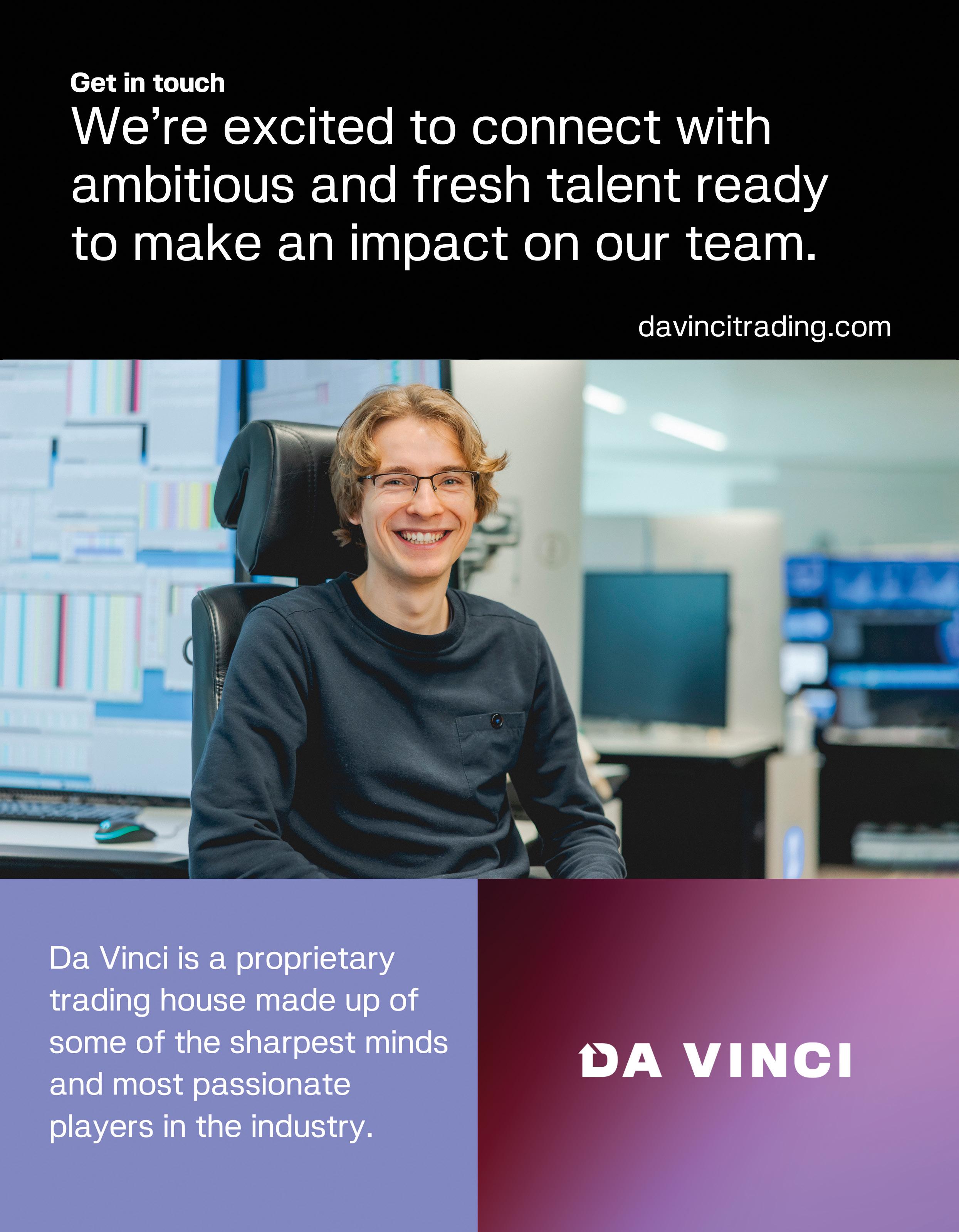
Looking for an intellectually challenging career option?
Kick start your career as a patent attorney with us
What does it involve?
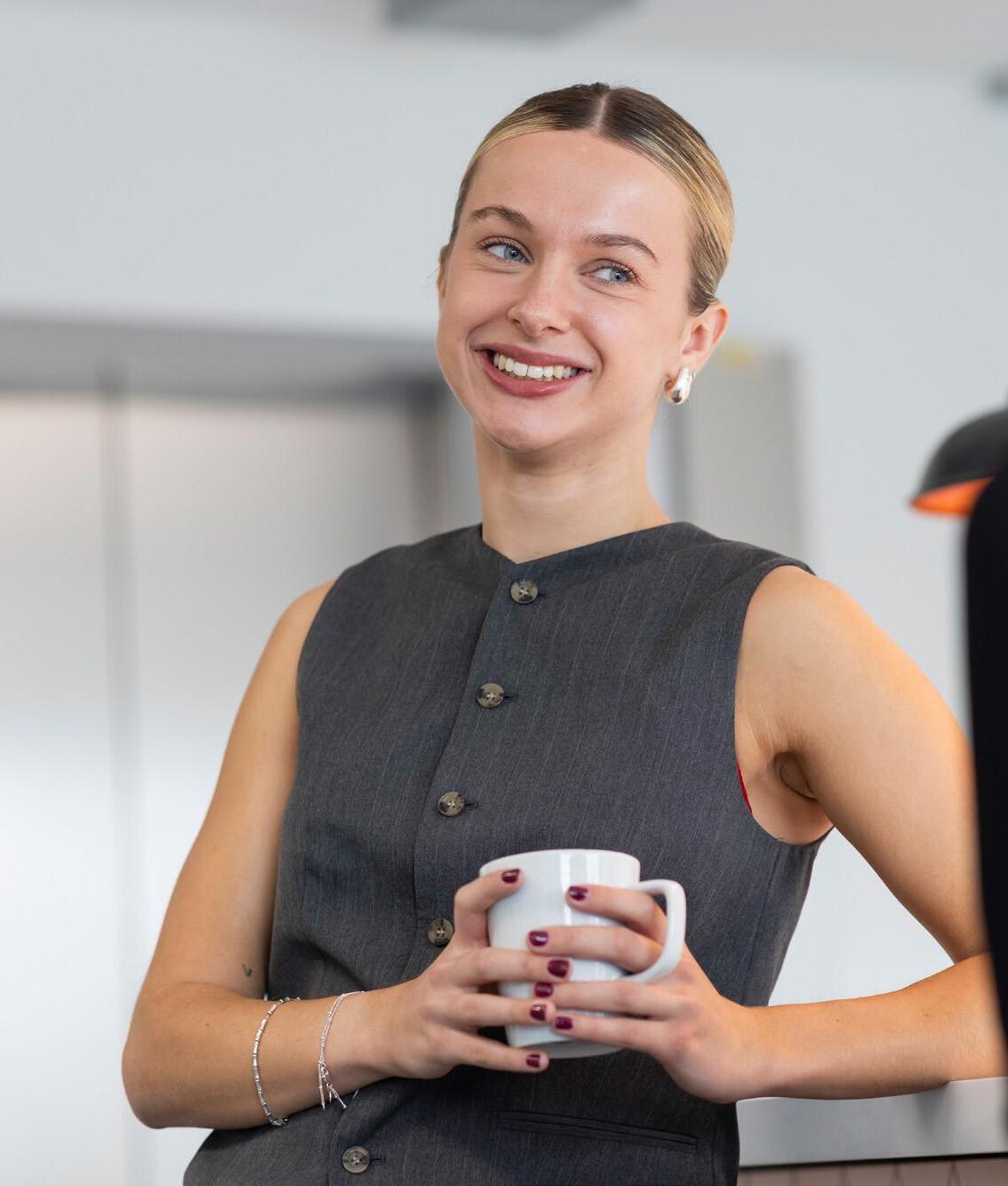
Training as a Patent Attorney is a career path that will enable you to combine your understanding of science with legal expertise. You will leave the lab environment yet remain at the cutting edge of science and technology, applying your knowledge and skill in a commercial context. You will help to protect intellectual property assets and grow businesses.
Sound interesting?
J A Kemp is a leading firm of UK and European Patent and Trade Mark Attorneys with offices in London, Oxford, Cambridge, Paris and Munich.
Visit our website for more information about training as a Patent Attorney. jakemp.com/careers/trainees

J A Kemp LLP
J A Kemp LLP is one of the largest UK and European Patent and Trade Mark Attorney firms, with offices in London, Oxford, Cambridge, Paris and Munich. J A Kemp’s Patent Attorneys handle patent applications in the UK, Europe and worldwide. The firm works for a huge variety of clients, from startups, spinouts and SMEs through to some of the largest corporate clients and most prestigious academic institutions in the world.
Training as a Patent Attorney is a career path that will enable you to combine your understanding of science with legal expertise. You will leave the lab environment yet remain at the cutting edge of science and technology, applying your knowledge and skill in a commercial context. You will help to

protect intellectual property assets and grow businesses.
We offer a programme of training to take you right through to qualification as a Patent Attorney (European and UK Chartered). We support you with one to one mentoring, external courses, internal tutorials and on-the-job training. We are very proud of our exam success rate and we will continue to support your professional development throughout your career with the firm.
If you are interested in a career as a Patent Attorney, and for information on applying for our 2026 Trainee Patent Attorney intake, please visit our website: https://jakemp.com/en/careers/




Top tips for your CV
Congratulations! You have come this far in your education. I imagine it has been tough with sacrifices, frustrations, and hopefully joy and celebrations along the way. You now face the exciting challenge of applying your expertise in your chosen sector. However, the job market is increasingly uncertain with job site Indeed reporting that graduate vacancies are down 33% from 2024 and the IMF stating that ~30% of knowledge-based jobs in advanced economies may be negatively affected by AI.
So how do you ensure that your CV performs well in the fierce competition for high quality graduate roles? Of course, evolving technology also impacts your job search, with ~99% of FTSE-listed and Fortune 500 companies using AI-driven technology in their recruitment. Understanding how this impacts your CV is vital.
Sarah Lovell’s Top 5 tips for CV key word optimisation will ensure the celebrations continue through to job offer.
• Have faith in the experienced recruiter. I read many graduate CVs that waste space evidencing skills such as team work, leadership and collaborationexperienced recruiters appreciate that, having passed the rigorous University of Cambridge selection process, you have these skills. Rather, they want to assess how your education and experience make you a suitable candidate for interview, using ATS software to identify key words and phrases in your succinct CV.
• Analyse the job description and person specification for specific qualifications, technical skills, software proficiency and industry-specific lexicon. Then appropriately include these in a short profile, a skills section and the first 3 bullet points of your work experience or education summaries. However, avoid using AI to write your CV or ‘engineering’ your CV with overuse of key words.
• Use a basic template rather than a ‘designer’ template. I cannot emphasise this enough. ATS software struggles with tables, text boxes, graphics, icons and logos. If your CV is readable by ATS software, you naturally increase your chances of it being read by a person.
• Use one font throughout, avoid bold capitals and use classic heading such as Career Summary or Work Experience rather than ‘Me So Far’ and ‘Where I Excel’. This helps to signpost AI through your CV.
• Get a trusted friend with exceptional English language skills to proofread your CV and to check that you have been neither overly modest nor overly confident. Both are unhelpful for the recruiter.
So you are through to interview! Nervous?
Sarah Lovell’s Top 5 tips will ensure you maximise this valuable opportunity.
• Prepare then prepare again. Dig into every corner of the company’s website, read their employees’ profiles on LinkedIn, look at company data on Companies House, identify key competitors and do the same for their companies.
• Dress appropriately even for telephone interviews and be familiar with platforms such as Zoom and Teams. There are excellent free resources online to practice for virtual interviews so practice, practice, practice.
• Roleplay your responses to potential interview questions with a friend. Notice filler words such as ‘um’ and ‘uh’ and work to eradicate them. Despite any nerves, remember to smile appropriately, even on telephone interviews as this comes across in your voice.
• Clarify your motivation for applying to a specific organisation and articulate it clearly in your mind. You will be questioned about motivation at interview.
• Be yourself - a job is a serious commitment for all parties so being transparent about your expectations and needs as well as allowing the recruiter to gain a true picture of what you offer is essential for success.
Being proud and confident in your accomplishments and taking this through to interview will ensure you do well. I wish you every success!

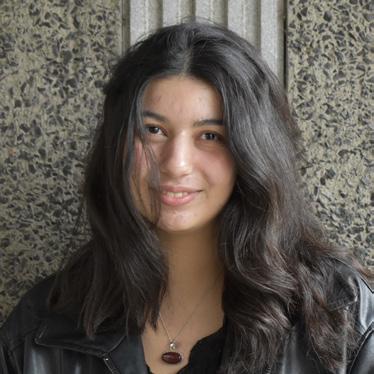
Finding my way…
Sarah Abbas graduated from Churchill College in 2023 with a degree in Natural Sciences.
My years at Cambridge were some of the best of my life. By my third year, I found myself becoming nostalgic over moments yet to end. My daily cycle to the Whipple. Running into familiar faces in ‘Mainsbury’s’. My exquisite college room overlooking the vast Churchill field. Yet, as they say, all good things must come to an end.
The ‘Cambridge Bubble’ burst abruptly for me. One moment, I was balancing my dissertation with Varsity deadlines; the next, I was standing at graduation, distracted, as my friends compared graduate schemes. The real world was looming. I wasn’t ready to leave behind eight-week terms or Wednesday Revs, but choice didn’t factor into it. I scrambled together an application and landed a last-minute place on a graduate scheme. This was the prescribed formula, and it had to work.
My first job after graduation was no dream by any stretch of the imagination. I arrived in London in November, and the city felt cold and uninviting. Gone were the days of having thirty of your best friends just five minutes away. Instead, my mornings began wedged into the tube like a sardine, watching the glass fog up. The office felt sterile, exposed, nothing like the hidden corners of the University Library where I once found focus.
I launched into the role with a naive optimism that barely lasted three months. Quickly, I learnt how differently merit was awarded in corporate London. Visibility was favoured over quality, likeability over talent. The ability to write four essays a week suddenly seemed irrelevant.
In many ways, Cambridge had prepared me more than I realised. It was its own microcosm of the working world. The same archetypes I had encountered in student societies resurfaced time and time again. The politics, the hierarchies, the unwritten rules - all of it felt familiar. Even the city held echoes of university life with picturesque buildings, the convergence of ambitious people from all over the world and the uncanny resemblance between the British Library and Sidgwick Site.
What I eventually realised is that Cambridge had given me a unique skillset that didn’t need to fit into a mould. I was able to work independently, think critically and pour into pursuits that gave back as much as I put in. I was ignorant to think a graduate scheme was the only way to move forward. Slowly, I began exploring other options, offering my skills up in a different way and finding purpose in my work.
If there is one thing I’ve realised since graduating, it’s that life after Cambridge doesn’t come with a handbook. We are sold the illusion that there is one blueprint for success after graduation: graduate scheme, promotion, flat in Clapham. There is a narrative that this is the only way to navigate postgraduate life. In reality, everyone I know is following a different path, with the only constant being the confidence Cambridge gave us to forge our own.
Why the world needs creatives now
In uncertain times, it can be tempting to think of the arts as a luxury. Yet perhaps this is exactly when creativity matters most—when we need new ideas, fresh ways of connecting, and bold perspectives.
“When someone pursues a career in the arts, they are choosing a path of collaboration, empathy and imagination—in other words, the skills and values that allow societies to innovate and thrive,” says Kate Budgen, Joint Course Leader of MA Performance.
With careers now stretching over decades, pursuing work you truly care about has never been more important. For many, the arts provide that. “With Music Direction, you're absolutely surrounded by creativity and creative people” enthuses Rich Bates MA/MFA Music Direction Course Leader, “Nothing is quite so rewarding as conducting a company of people you care about through a show you've worked on together.”
Mountview’s MA and MFA programme is built to turn passion into a profession. Degree options include Acting, Creative Producing, Musical Theatre, Directing, Dramatic Writing, Music Direction and
Theatre for Community & Education, and collaboration is central - students work closely with peers and industry professionals, creating networks that last well beyond graduation.
That balance of rigour and community makes the experience transformative. As MA Musical Theatre graduate Melisa reflects: “The course not only taught me the performance skills I needed to navigate through the industry but also provided me a diverse community of creatives who I still collaborate and work with today.”
Mountview’s MA graduates go on to impressive careers. Notable names include director Michael Longhurst (Next to Normal, West End/Broadway), actor Melissa Kiplagat (Country Queen, Netflix), actor/writer Anne Odeke (Princess Essex, Globe), and Olivier-winner Will Close (Dear England, National Theatre).
For graduates weighing their next steps, the message is clear: the arts are not just a calling but a profession — one that offers challenge, collaboration and purpose.
Mountview.org.uk

TURN YOUR PASSION INTO A PROFESSION
Rewarding and intellectually rigorous postgraduate degrees in Performance, Stage and Production Management, Theatre for Community and Education, Creative Producing, Directing, Dramatic Writing and Music Direction.

EMILY ABOUD - Director, Playwright and Theatremaker Winner of the Evening Standard Future Theatre Award
Photo by Steve Gregson Photography
Finding my way…
Famke Veenstra-Ashmore graduated with a BA (2023) and MPhil (2024) in English from Gonville & Caius College.
Swapping town for gown…
For many people, graduating from the University of Cambridge also means getting away from Cambridge. I certainly understand the feeling of wanting to move on – Cambridge is small. The university lifestyle is famous for its stresses and pressures. But through a combination of luck and coincidence I’ve ended up staying and this will be my sixth (!) year living in the city.
Like many others, I partly did a master’s to prolong my stay in Cambridge. My first year had felt like a fever dream: matriculating in masks and a fresher’s week on zoom left many of my cohort feeling like they had missed out on the full ‘Cambridge experience’. So, for the rest of undergrad, I put my all into everything: student journalism, creative writing, and access and outreach.
As a member of a central college, I regret rarely venturing more than a mile away from my room. However, in my master’s year I was allocated a room in a house near Mill Road. I got to know a whole different side to the city. I also managed to tick off a couple more ‘bucket list’ items such as editing The Mays (which was, according to legend, envisioned in a Caius postgrad house just next to mine).
inspired by one of my Varsity investigations. I didn’t expect even an acknowledgement, but they offered me an internship to write the report once I had graduated.
The report drew a surprising amount of interest, and it felt good to get people debating an issue which was important to me. The research made headlines in national papers like the Telegraph and even reached Camfess (for better or for worse). Not all the reaction was positive – I even had an (unflattering) Times column directed my way. But the experience taught me a small idea can go a long way – you just have to go for it.
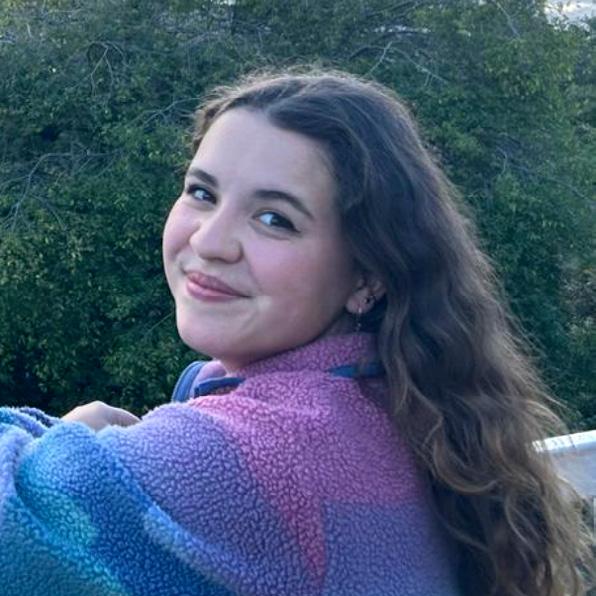
My time at HEPI concluded soon after the 2024 General Election. Given the success of Labour – the party I’d been a member of for almost 10 years – someone suggested I apply for a role in an MP’s office. Until then, I had no idea that MPs had staff working on policy, comms and research. It really is true that your next job could be something you didn’t know existed.
I spent some time agonising over whether to do a PhD. At that point, though, I really was feeling the burnout and putting off the ‘what to do with your life’ question was finally catching up to me. Luckily though, some of the work I’d done with Varsity had left me with a few ideas of how to continue writing without committing to another degree.
The summer after graduating, desperate for something to do, I sent a small think-tank, the Higher Education Policy Institute (HEPI), a short proposal for a research project
I wasn’t sure if I had the qualifications, but after a few failed attempts (including going into someone else’s interview), I was offered an internship in the office of an MP. Without really coordinating, my partner got a job in Cambridge. And so, somewhat unexpectedly, it was back to Cambridge for us.
I now work full-time as Policy Assistant in the same MP’s office and live in a lovely small village just outside of the city. My work is diverse: I’m learning more about local communities, as well as more technical bits like government legislation and policy making. And having swapped gown for town, and formals for Histon Beer Festival, I’m once again seeing Cambridge in a new light.
Thinking about Transitioning from Academia?
Many of our roles at Costello Medical are open to individuals with a diverse range of backgrounds. This means we provide individuals with advanced degrees the opportunity to transition into rewarding careers in healthcare consulting.
Feeling
Eleanor Atkinson, Senior Analyst, PhD, University of Cambridge
Hear from team members who have successfully transitioned into a fulfilling career with us.


Costello Medical
Costello Medical is a rapidly expanding global healthcare agency dedicated to advancing healthcare through specialised services in medical communications, market access, and health economic and outcomes research. With a commitment to excellence and innovation, we collaborate with a diverse range of clients, including leading pharmaceutical and medical technology companies, patient advocacy groups, public health organisations, and charitable foundations. Our strong, enduring client partnerships enable us to make a tangible and measurable impact, supporting the successful launch and adoption of novel therapies and medical devices across a broad spectrum of disease areas.
At the core of our mission, we are dedicated to improving patient outcomes and healthcare efficiency by providing scientifically robust, strategically tailored solutions. Our multidisciplinary teams work closely with clients to develop compelling medical narratives, facilitate evidence-based decision-making, and address the complex challenges facing the healthcare industry today. This client-centric approach, combined with our deep scientific expertise, ensures that we deliver innovative insights and impactful results.
Our vision is to foster a vibrant community of the very best professionals, constantly striving to challenge ourselves and deliver outstanding contributions to healthcare. We believe in cultivating a dynamic, inclusive, and inspiring workplace where talent and collaboration thrive. As part of our commitment to social and environmental responsibility, we are proud to be a certified B Corporation, affirming our dedication to using business as a force for good. This commitment to our people, clients, and the planet has seen us recognised through our inclusion in The Top 100 Companies to Work For list for five consecutive years, underscoring our dedication to creating a fun, friendly, and high-quality environment.
Guided by our core values - integrity, innovation, excellence, and support - we aim to deliver services of the highest standards while maintaining a supportive and engaging workplace culture. By aligning our goals with our clients’ needs and health priorities, Costello Medical continues to shape the future of healthcare, making meaningful contributions that benefit patients, healthcare providers, and society at large.

Careers in engineering, science & technology
ECM Selection, helping graduates, PhDs and professionals find top roles with leading UK science and technology companies for over 30 years.
At ECM Selection in Cambridge, our personal approach is there to provide you with exciting options when you are looking for a job. Over the years, we have worked with graduates, PhDs and postdocs as well as experienced industry veterans, throughout their careers.
Do you work with all types of companies?
Everything from start-ups and university spin-spinouts to boutique specialists and multinationals. We have worked with companies with unicorn status, as well as those starting out in a garden shed.
How about internships, placements, sponsorship?
We can help with permanent, full-time positions after graduation. Visa sponsorship is typically reserved for senior or very specialist jobs due to government criteria.
How about research?
We work with R&D teams and research groups in product development and applied technology, with a strong scientific angle, rather than fundamental scientific research.
Why should I use a recruitment agency?
It’s important for your CV to stand out from the crowd since graduate and PhD-level competition is very high. A recruiter who knows the company well can advise and guide here and on interviews and job offers. Provided they have a sufficiently strong reputation, and are specifically engaged by the company and understand their business, a recruiter’s introduction can be a real asset.
Don’t you just find jobs on the internet, and suggest them to people?
Far from it. All the roles ECM offer are with companies who specifically asked for our help, are pleased to hear from us and whom we may have known and been building relationships with for years. Our “non-pushy” approach extends to companies as well!
I’ve heard stories about variable experiences with recruitment agencies. Why are ECM different?
Whilst some agencies may match keywords to recruit in technical areas they don’t fully understand, ECM consultants all have technical backgrounds and industry experience in the sectors for which we recruit. Some agencies are also primarily concerned with filling a particular job, rather than finding the right role for the person. In contrast, ECM offer a more personal, relaxed and “non-pushy” service. There are no salespeople here and we don’t spend our days talking people into things. We’d rather find ideas for people that they like, and will help them progress their career in whatever direction they choose.
Sounds like a great service, but is there a catch? Do I need to pay…
Our service and advice is absolutely free to candidates. If you’re in an area we cover, ECM would be happy to see what opportunities we can help with.

Great, so I’m interested, what should I do next?
In plenty of time before you graduate, register with us on our website, https:// www.ecmselection.co.uk/university
Or call ECM Selection on 01223 813399 to discuss your search with one of our consultants. If we can help, we’d be pleased to. We may ask for a copy of your CV for our reference, but that will only be sent to companies with your express permission in each case, after we’ve spoken with you.


Doctoral positions at INSEAD: Study in Asia & Europe with five-year funding
INSEAD, one of the world’s leading and largest business schools, is now accepting applications for the PhD in Management, for entry in mid-August 2026. Each year, we select 16–18 exceptional individuals into our prestigious doctoral programme across eight fields: Accounting, Decision Sciences, Entrepreneurship, Finance, Marketing, Organisational Behaviour, Strategy, and Technology & Operations Management.
Our INSEAD PhD is a highly intensive and rigorous programme designed for individuals with a strong passion for research and a clear drive to build a successful academic career at top business schools worldwide. Unlike many other doctoral programmes, it seeks to admit research partners for its faculty, not research assistants.
Our programme is fully integrated across INSEAD’s Europe (France) and Asia (Singapore) campuses, allowing students to study in both locations and benefit from our strategic partnerships with Wharton and Sorbonne Université, as well access to our state-of-the-art Behavioural Lab in Paris. As many leading universities aim to internationalise their curriculum and faculty, the INSEAD PhD gives students a significant advantage with its global format over most management schools. With a strong track record of placements at top business schools worldwide, our graduates are well-positioned for long-term success in academia.
We welcome applicants from diverse academic backgrounds, including economics, engineering, psychology, sociology, and the sciences, who demonstrate strong academic performance and faculty recommendations, competitive GMAT or GRE scores, and a clear motivation for research and a career in business academia. All admitted students receive five years of full funding, such as a tuition fee waiver, stipend, research/conference budget, and international health insurance.

Apply by Monday, 5 January 2026, for entry in August 2026 at inse.ad/phd-apply.
Want to learn more about the INSEAD PhD?
Please email our Associate Director of Recruitment and Admissions at ann.julaton@insead.edu
inse.ad/why-insead-phd | inse.ad/phd

PhD in Management
A life of intellectual leadership and influential scholarship.
The INSEAD PhD offers a truly global experience. With campuses in Asia and Europe, the programme combines rigorous research training with a vibrant, international community of scholars.
PhD students benefit from close collaboration with world-class faculty and strategic alliances with The Whar ton School and Sorbonne Université, gaining exposure to cutting-edge research and innovative teaching. Graduates go on to launch successful academic careers at top business schools worldwide, producing impactful research that shapes the future of business and society
At the INSEAD PhD, we nur ture the brightest and most creative minds from diverse backgrounds, equipping them with the tools, mentorship, and global perspective needed to become leading researchers in management.
Are you ready to launch a prestigious and global academic career? Apply now for entry in mid-August 2026.
inse.ad/why-insead-phd inse.ad/phd-apply inse.ad/phd









Finding my way…
Rebecca Thomas graduated from St John's College in 2019 with a BA in History and an MPhil and PhD in Anglo-Saxon, Norse and Celtic.
As I’m writing this, I’m en route from Cardiff to Cambridge by train – a journey I undertook dozens of times as a student, more often than not with too much luggage. When I arrived at Cambridge to read history in October 2011, I was adamantly uninterested in the pre-modern world. Nine years and three degrees later I’d finished a PhD thesis on identity construction in early medieval Wales.
Much like the number of carriages on the Cardiff to London Paddington train service, the next steps were uncertain. Rejection emails were a daily occurrence; one that began with “Dear [INSERT CANDIDATE NAME]” was a particular highlight. But six months after submitting my PhD thesis, I was lucky enough to obtain funding from the British Academy to pursue a postdoctoral research project.
exercise book; whilst my teenage years were spent on a sprawling 900,000-word fantasy trilogy. I quickly found that I enjoyed it just as much as a twenty-six-year-old as I had at sixteen, but under the influence of my history degree I gravitated towards historical fiction.

This decision to reacquaint myself with an old hobby in 2019 has turned out to be more pivotal than I could ever have anticipated.

This set me on a different train line, across the north Welsh coast to Bangor. Graduating and moving to an entirely new town where I didn’t know many people was daunting and not without its challenges. However, I was ready for something new. Work had dominated my life at Cambridge, especially in the final months of my PhD, and so when I moved to Bangor, I committed to carving out time for hobbies. This led to the rediscovery of a hobby that had fallen victim to my poor work-life balance: creative writing. I’d written by first ‘novel’ at age 11, a Star Wars spin-off called ‘Vader Returns’ in a grey lined
I’m now working as a senior lecturer in medieval history at Cardiff University but have also published four novels for young adults. I’ve begun to use my creative writing as a way of engaging a wider audience with the medieval past and do a lot of creative history workshops with secondary schools, introducing pupils to medieval myths and legends. These workshops never go as expected – nobody is quite as blunt as an elevenyear-old pointing out your plot holes – but doing history in this way is immensely rewarding and, quite simply, a lot of fun.
I never expected to end up back at Cardiff, the city where I grew up. Nor am I sure for how long I’ll be here. It’s no secret that it is a turbulent time for the higher education sector, and my particular university has had its share of headlines over the past year, including proposed cuts to the humanities. The publication of my first novel for adults earlier this year, a dystopian campus novel reflecting on the higher education sector in Wales and its possible future, is sadly timely.
Wherever I go from here, however, I’ll be sure to take my pen with me. In short, I’m glad that I took the time in 2019 to remember what I enjoy doing most.
Finding my way…
Lotte Brundle graduated from Hughes Hall in 2022 with a degree in English.
Next week I turn 26. Life at university seems a long way away, even though I matriculated as a mature student, aged 21. Five years have passed and so much has happened since then. Relationships have come and gone. I’ve had two breakups, one excruciating, the other less so. I’ve moved house three times in quick succession, living with strangers, then finally friends. I’ve been in and out of love, in and out of work and in and out (though let's face it, mostly out) of money.
Since graduation, I’ve been in two very different full-time jobs: one in magazine journalism, where the hours are flexible, and you're dealing with luxury PRs one minute and sheep farmers the next (my current job at Country Life magazine). The other in news production at The Times and The Sunday Times, where a daily challenge was the correct spelling of Netanyahu and making sure I hadn’t accidentally committed libel — a far cry from what I thought I’d end up doing when I was in my first role at Varsity, as one of three editors for Violet, the newspapers now defunct (for good reason) comedy section. I have also been a student again, and unemployed (not fun).
I graduated with a masters in what many called a ‘highly unemployable discipline’, Magazine Journalism — look at me now, naysayers. It cost a fortune so I am glad it has paid off. My unemployment phase after this fortunately wasn’t long, but only because I applied for jobs like a rabid animal, the fear of maxing out my overdraft and having to move back in with my parents spurring me on brilliantly.
enjoying lukewarm wine under £5 and also crop tops). But many things have stayed the same. I still want what I wanted when I left Cambridge: a fun job and a happy life. This, I have achieved. Do I make a lot of money? Ha ha ha. If you want to be rich, be a consultant. The industry I went into is competitive and poorly paid.
The city I live in is cramped and expensive, with poor air quality. The room I rent is small. Don’t let me sugarcoat it, living in London and working in the media is not as glamorous as it’s made out to be in 2000s romcoms. And yet, I work in a job where I am always learning, travelling to new places, meeting interesting people and, most importantly, where I get to write, for money. I couldn’t have been any luckier, especially because laying the groundwork was expensive, and I was fortunate to have financial support from my parents when it came to my MA. I guess what I am trying to say is: yes, choosing a lower-paid role can be competitive and mean being very skint and living in a flatshare in an area of London that has one of the highest crime rates in the capital (cheap rent hack). But it can also mean having the career you want, and the life you want, on your own terms. For me, that makes it worth it.

Since graduation I have fallen out of touch with good friends and gained new ones. The first part is sad but, I fear, universal. The latter is brilliant. My body has changed (goodbye fast metabolism of my university days and also my tolerance to gluten) and so have my tastes (goodbye
Lotte at work, in a beekeeping suit. A job at a countryside magazine means she is never bored.
Launch your career in trading, technology, or
research
Discover graduate and internship opportunities designed to empower you with the tools, training, and mentorship needed to solve the industry’s toughest challenges. Experience a flat, collaborative culture where great ideas come from anywhere, and your growth is supported from day one.

Scan to apply


